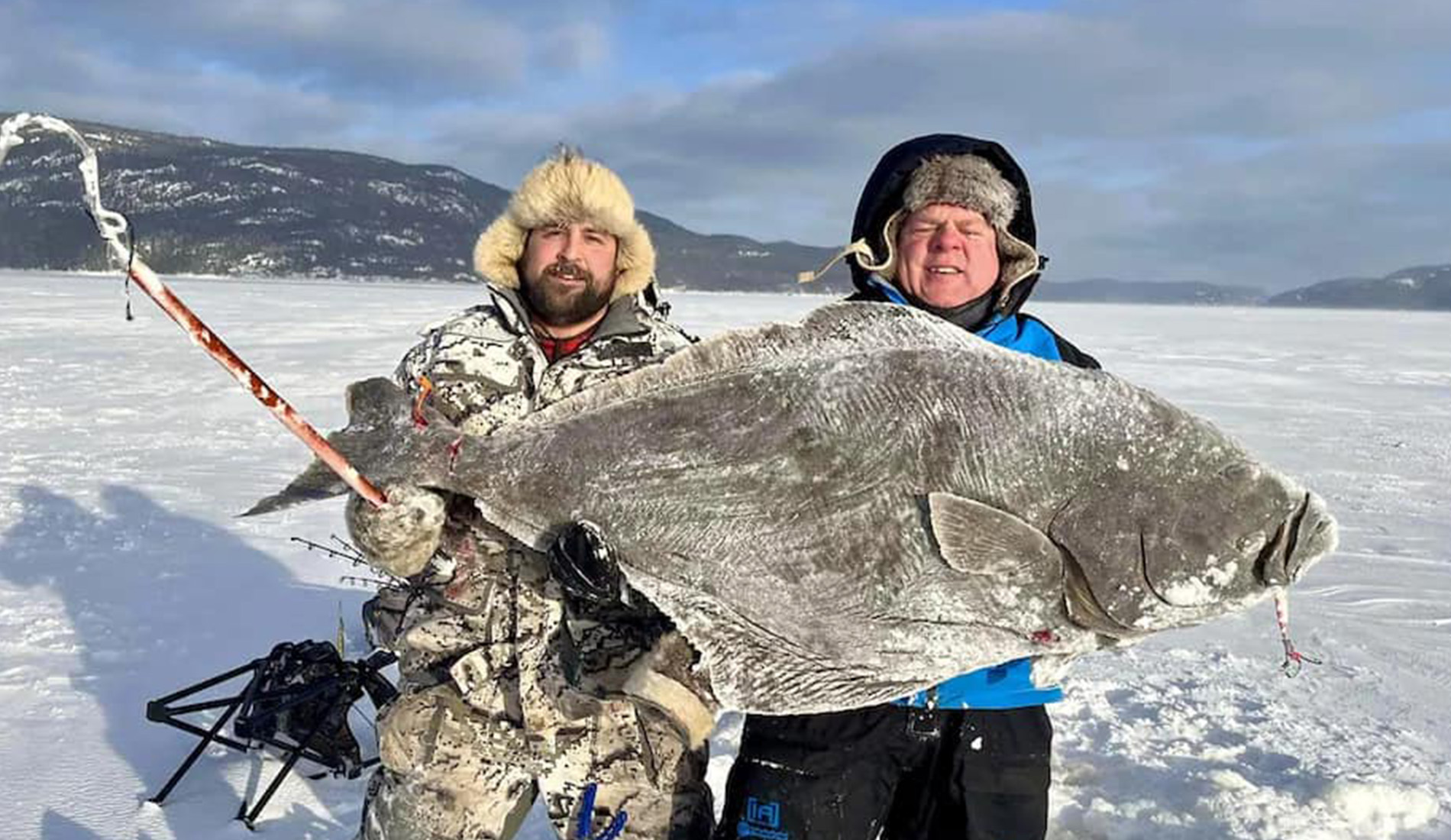A group of Quebec anglers hooked into a giant halibut on Sunday that weighed over 100 pounds. With the help of two other fishermen, Rémi and Mathieu Aubin landed the fish after a four-hour battle. But first, they had to widen the hole they’d cut. It’s an image that many hard-water anglers would have a hard time wrapping their minds around: pulling a 109-pound Atlantic halibut through the ice.
U.S. anglers regularly chase Pacific halibut along the northern reaches of the West Coast — particularly in Alaskan waters. We can even target Atlantic halibut off the coast of Maine, which holds a brief sportfishing season in May and June. We can also fish for a bounty of freshwater species during the winter, when the ice on our local lakes gets thick enough. However, there are very few places, especially in North America, where you can ice fish for the world’s largest flatfish.
One of these locations is Saguenay Fjord in the Saguenay-Lac-Saint-Jean region of Quebec. It’s where a large freshwater river, the Riviére Saguenay, meets the St. Lawrence River as it forms a narrow, deep inlet in the Gulf of St. Lawrence. This creates a unique fishery where the fresh water from the river flows over the salty water of the gulf and freezes solid. (Seawater freezes at a lower temperature than freshwater, and it has to be colder for longer since bays are typically deeper than lakes.)

Photograph by Rémi Aubin
Canadian ice fishermen have long plied these waters, and over the years, there’s been the occasional report of an angler catching a giant Atlantic halibut while fishing for cod, skates, and other species. But since Atlantic halibut are protected — they’re classified as endangered by the International Union for the Conservation of Nature — the law has traditionally required sport fishermen to release any halibut they catch. This changed in 2022, when the Canadian government decided to make an exception to the law in the name of science.
The Atlantic Halibut Winter Fishing Project for Scientific Purposes has continued in the Saguenay Fjord in the two years since. It allows ice fishermen in the area to harvest a total of 100 Atlantic halibut over the course of a season. They must first obtain a special license from a local scientific committee, and the minimum length for harvest is 85 centimeters, or around 33 inches. (Regulations still require smaller fish to be released alive.) These harvested fish are then studied by scientists so they can learn more about the halibut that inhabit the fjord.
Read Next: Michigan’s Shortest Fishing Season Lasted Exactly 36 Minutes This Year
“Studies suggest that the populations of some groundfish species in the Saguenay Fjord are ‘sink populations,’ which means they are isolated from those of the Estuary and Gulf of St. Lawrence,” scientists with Fisheries and Oceans Canada write. “In the case of Atlantic halibut, this issue has been little studied … and the data collected during the project will help advance knowledge of the species.”
The 109-pound Atlantic halibut that Rémi and Mathieu Aubin caught on Jan. 21 was the first one harvested as part of the scientific project this winter. A series of videos uploaded to Facebook show the two anglers fighting, landing, and then weighing the massive fish in front of a crowded room at the Musée du Fjord.

Photograph by Mathieu Aubin
Neither of them were able to provide comment on the catch due to a language barrier (both men speak French), but Mathieu posted photos of the halibut on Facebook a day after they caught it.
“What to say after 24 hours…honestly I’m still speechless,” Mathieu writes in a translated version of the Facebook post. “Living this moment with Rémi Aubin touches me enormously. When I was younger, only a few years old, he took me with him to different bodies of water, [including] of course the majestic fjord. He not only passed on this passion to me, but more importantly, these values!”
Mathieu adds that, in honor of those values, he’ll be donating the meat from the giant halibut to 16 people in need. He clarifies that he won’t be accepting any money in return because, just like in the U.S., it’s illegal for sport anglers to sell their catch in Canada without a commercial license.

